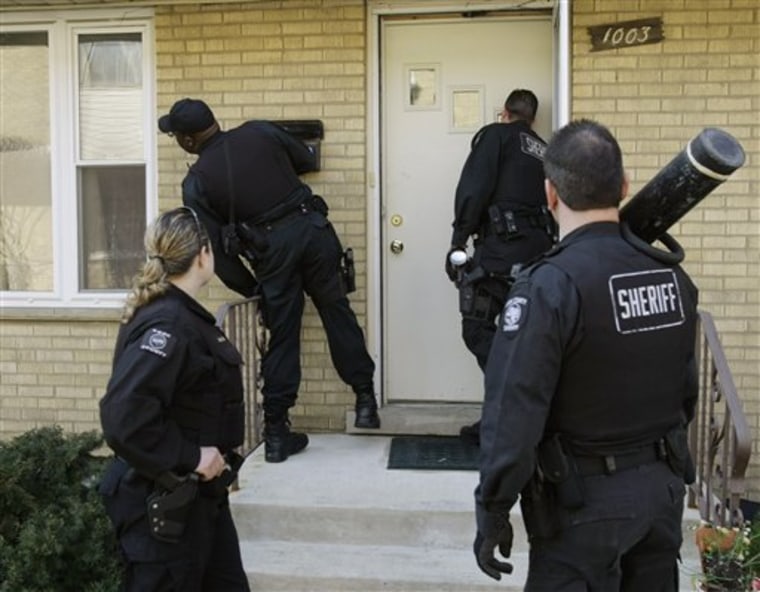On a quiet street lined with neat homes and trim lawns, squad cars pull up to a suburban Chicago house where the owners have fallen behind on their mortgage payments.
Sheriff's deputies pour out of the vehicles but not to force the people out of their homes — yet. This visit is one of three now required before residents are evicted.
They knock loudly, but nobody answers. Minutes later, they are gone, leaving only a paper glued to the door.
This is what the foreclosure crisis looks like in Cook County, where the sheriff made headlines last fall when he briefly halted evictions of renters who did not know their landlords had defaulted on mortgages.
What has emerged is a kinder, gentler eviction process. Now banks must prove that tenants were notified 120 days in advance. Deputies visit the properties three times before the eviction, and a social worker helps connect the residents with public services — sometimes even putting them in touch with new landlords.
It's one of the only known efforts by a sheriff's department to make evictions more compassionate.
"You're dealing with people who are on their last bit of whatever, whether it's the last bit of a divorce, of their money or their job is ending," deputy Kyle Tryba said.
The goal is to give families more time to find a place to live.
Offering guidance
For those facing eviction, the deputies offer information on social-service agencies that assist children, the disabled and the elderly. Sheriff Tom Dart even hired a social worker to help.
"Rather than just say 'Here's a number to call, good luck,' she'll call her contact at an agency and say ... 'I'm going to have this person call you because they need X, Y and Z," sheriff's spokesman Steve Patterson said. "She sort of opens a door."
It all adds up to a procedure that may be unique in the U.S.
"I don't know of anyone else taking all those steps," said Fred Wilson, the National Sheriff's Association's director of operations, who says he plans to call Dart to get more details. "I would want to share those with our folks (because) they all see the same dilemma."
The recession and the housing crisis have sent foreclosures skyrocketing. In February, more than 290,000 U.S. properties received at least one foreclosure-related notice, according to RealtyTrac, a foreclosure listing company. That's up 30 percent from last year.
Cook County foreclosures more than doubled over two years, with 42,000 last year. During the same time, foreclosure evictions tripled, to more than 4,500 last year.
The new rules mean people on the brink of eviction do not have to worry about returning home from work to find their belongings on the front lawns and the locks changed.
'It was terrible'
Under the old rules, Alma Aquino learned that the building where she rents an apartment was in foreclosure when she received a frantic call from her husband telling her the sheriff was there to evict them.
"It was terrible," said Aquino, who has two children, 7 and 14. "My (children) don't know what happened, my daughter said, 'I didn't do nothing, Mommy.'"
Aquino and the other tenants, who paid their rent on time and whose names were not on the eviction papers, helped convince Dart to change the process. Today Aquino is still in her apartment and the case is in court.
Since the weeklong moratorium in October, deputies have carried out only about 65 of 805 eviction requests. The drop is partially because the eviction process now takes longer, and the numbers are expected to rise as more residents get their third notice.
Each eviction carries the potential for danger. In October, an elderly Ohio woman shot herself as authorities arrived to evict her. She survived, but in February a Colorado man shot and killed himself just before deputies arrived to evict him.
'Hey, Mr. Policeman'
In Cook County, deputy John Darge recalled opening a door to a man sitting on his couch — a gun inches from his hand. Deputies quickly grabbed the gun and nobody was injured.
"We need those things to happen to remind you: You never go in with your guard down," he said.
But deputies say they are most affected by the children.
"Frequently you knock on the door and the first thing they (children) do when they see you is say, 'Hey, Mr. Policeman,' and they want to hug your leg, latch onto you," said Darge, a father of four.
He recalled a 7-year-old boy who was happy to see Darge and looked at him like he was his best friend.
"I took the kid and said, 'You're going to be going with Mommy and not going to come back. If you've got a favorite book, toy, game, why don't you show it to me?'"
